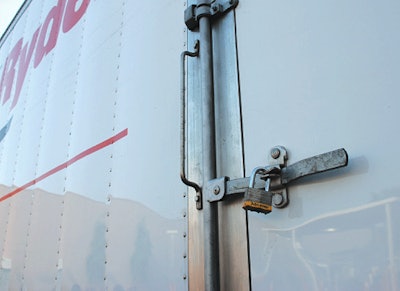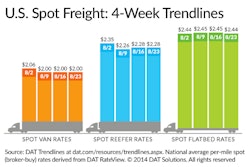
A recent settlement should be a warning to carriers about the contracts they have with customers and about their load-accepting practices, especially for high value cargo: A federal judge in Ohio just awarded a broker $5.9 million for losing a load in a cargo theft.
The U.S. District judge Aug. 26 ruled to award the Ohio-based Excel Inc. the multi-million settlement in its case against Southern Refrigerated Transport, out of Texarkana, Ark.
At issue was a 2008 shipment of pharmaceuticals stolen from a rest stop near Dickson, Tenn., while en route from Exel’s Mechanicsburg, Pa., warehouse to Memphis.
Following the theft of the shipment, Exel filed a claim with SRT on behalf of pharmaceutical maker Sandoz for $8,583,671.12, the alleged actual value of the lost goods. SRT denied the claim.
In court, SRT argued that its liability was limited under the Carmack Amendment to the value on the bill of lading, $56,766.36.
The Carmack Amendment to the Interstate Commerce Act is the federal law governing interstate carriers’ liability for property loss. Based on the bill of lading, a shipper can be confident that the carrier will be liable for any damage that occurs to its shipment. And a carrier can accurately gauge, and insure against, any liability it may face for hauling that load.
But Exel successfully argued that the Carmack Amendment did not preempt the language of the Master Transportation Services Agreement between the broker and the carrier. And, under the MTSA, SRT owed Exel the replacement value for the shipper’s freight.
“It’s an interesting case and hopefully a good reminder to everyone in the marketplace – whether they’re a carrier, a broker or a shipper – that you need to take transportation contracts seriously. Make sure that you understand what you’re agreeing to,” says attorney Marc Blubaugh, Bensech partner and co-chair of the Ohio firm’s transportation and logistics practice group. “They need to be scrupulous about reviewing these contracts, and even some fairly sophisticated attorneys for carriers may not be attuned to the fact that contracting with a broker involves some different considerations than contracting directly with a shipper.”
Another “misapprehension,” and one argued in the case, is that a carrier’s liability is capped by the limits of its insurance, explains Blubaugh.
“In a carrier’s mind, they say the customer should have clearly understood that the maximum exposure was going to be $100,000 or $250,000 because that was the insurance that the carrier promised to have. Why would a carriers want to have an uninsured risk?” he says. “But those are two different issues, and the court here said that’s not going to work.”
SRT parent company Covenant Transportation says it expects to appeal the ruling.










